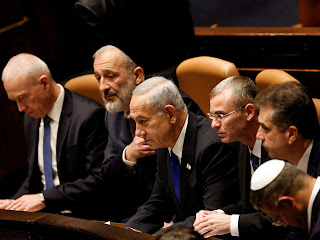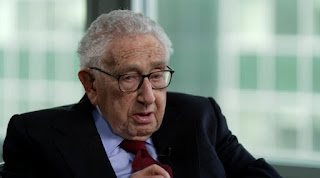Netanyahu outfront on multiple sidelines
Netanyahu outfront on multiple sidelines
How the economic stagnation
reflects the political crisis
After the turmoils of the demonstrations collapsing
the security establishment in the main streets of Israel, Netanyahu finally surrendered
on March 2023, announcing a “suspension” of the overhaul of the justice system and of the Supreme Court until
Jewish Easter, in order to avoid a civil war. But it’s not been a defeat for
the government, as he left the bill on the table of the most urgent affairs,
inviting the opposition to the dialogue for the necessary adjustments. The
protests were triggered by the Minister of Defense, Gallant, that, in the
general troubles devastating the country, has had the initiative to ask for a
break. The rally that gathered hundred thousand people in front of the Knesset,
in fact, paralysed Israel, showing up that perhaps a mere suspension is not
enough to appease this citizens’ anger, in the suspect that Netanyahu is just
taking time and “the magician” won’t give up. In addition to the focal point of
checks and balances that risks to be altered, undermining the basis on which
are founded all the contemporary democratic institutions, as demonstrated by detailed
studies of many human rights activists, the Court played an essential role in
legitimating the abuses against Palestinians. Thus, a profound shake up is occuring,
cracking down the core essence of the liberal democratic values propagandized
by the basic laws in Jerusalem.
This breakthrough was a result of a compromise with
the far right parties and in particular between Netanyahu and its Minister
of National Security Ben Gvir that appointed a ‘private militia’, a National
Guard of Volounteers under his direction, declaring that he would renounce to
oppose his veto to these reforms in exchange of this truce.
In the internal politics, Israel is currently facing
two crisis: “the only democracy existing in the Middle East”, as often it’s
defined, is threatened both by the government of far right parties and a drift
that encompasses all its institutions, included the Supreme Court, other than
an illegal military occupation.
Moreover, recently, the Knesset has approved the 2023-24 national budget and even more
complicated resulted to be the relation of the Premier with the Minister of
Finance, an extremist leader of the religeous zionism, Smotrich, that
declared that doesnt’t exist no more something called “Palestininan people”. A
lifeline for the premier could come from
Gantz and Lapid, open to the dialogue
and further agreements along with the Head of State Herzog in order to find
creative solutions. The premier Netanyahu leads a government made by extreme
ultranationalist and xenophobe parties that during last weeks have clearly
threatened to give up the majority if the executive wouldn’t take a stronger
position against Gaza. A clear warning for the premier, well aware that he should
avoid a government crisis that would expose himself to the judiciary
proceedings he would face. He needed, in fact, their votes in order to approve
the National budget and only once approved, the government could be sure to
survive without their help until 2025 spring.
The approval of the budget on Mai 24, which Prime
Minister Netanyahu depicts as his government’s victory, comes after weeks of
tense negotiations. The bill has been strongly criticised for jacking up the
state’s spending in discretionary funds, including grants for the
ultra-Orthodox Haredi community as well as for settlement projects in the
occupied West Bank. Allocating funds to hardliner pro-settler parties risks to
further exacerbate the situation in the Palestinian territories and a worsening
of instability could also undermine several actions on Netanyahu’s
international agenda such the ongoing normalisation process with Saudi
Arabia.
Thus, it’s self-evident that Israel will no longer be
able to rank itself among the world’s developed economies. The
budget allocates a huge number of resources to yeshivas (religious schools),
national-religious political organizations, and allies of Netanyahu. Israel marches towards economic stagnation. Without
overhauling the ultra-orthodox education system, Israel’s GDP is shrinking by
5% in a decade and 10 by 2050. At the end of the resounding bickerings, the
nearly NIS 998 billion ($270 billion) budget passed. The manner in which the
budget was allocated shows how Netanyahu is totally dependent upon Ben-Gvir’s Otzma Yehudit party for his
majority in the Knesset. This is the element tipping the balance
and influencing the prime minister’s decision-making in matters of security,
regional cooperation, and relations with the Palestinians.
In the meanwhile, in the Occupied Palestinian
Territories is registered an unprecedented rate of violence: clashes grinding on between Israel and Gaza,
where in Mai the IDF have killed Ali Hassan Ghali, leader of the rocket
launcher force by the Palestinian Islamic Jihad (PIJ), the second important
militant group in Gaza, after Hamas, and considered responsible of many of the
missilistic attacks that keep on hitting Israel in response of the fact that
Israeli government has worsened the punishing measures against Palestinians and
pushes for an expansion of settlements.. Egypt is mediating to guarantee a ceasefire
among both parts and the Israeli Foreign Minister, Cohen, declared that he’s
evaluating a Cairo proposal. The escalation is linked to the tensions provoked
by the launch from the armed Palestinian fringes of hundreds of rockets against
Israel, following to the death in jail of Khader Adnan, affiliated to the
Islamic Jihad, in hunger strike by 87 days. In this occasion the Egypt intervention
has been successful in order to get a temporary ceasefire.
The urgence of a negotiation, also sponsored by Qatar
and UN, is enforced by the fact that Palestinians are by now at the end of their
tethering. Recently, Netanyahu, backed by the US, talked twice with Saudi Crown Prince Muhammed bin Salman.
US efforts to facilitate normalization between Israel and Saudi Arabia are
occurring, in fact, against the backdrop of Israel fundamentalist government that
are making all their efforts to permanently annex the West Bank. The Crown
Prince has laid out several deliverables he needs before Saudi Arabia would consider
normalisation: a US security guarantee, access to US weapons systems and
assistance with a Saudi civilian nuclear program. Riyadh affirmed that
normalisation won’t happen unless Israel commits to establishing a Palestinian
state with a capital in East Jerusalem.
Kamla Harris, in occasion of the 75th anniversary of Israel’s foundation,
which was hosted by the Israeli Embassy in Washington, said that, under
President Biden, USA will continue to
stand for the values that have been the bedrock of the US-Israel relationship,
which include the strengthening of their democracies, as they are both built on
strong institutions, checks and balances and an independent judiciary. Cohen replied that he has great respect for Harris,
but the judicial reform is an “internal Israeli issue that is in its
negotiation stage and the State of Israel will continue to be democratic and
liberal, as it has always been”. In her speech, Harris
also referred to the Biden administration’s recently unveiled strategy to
combat anti-Semitism.
As far as is concerned, instead, the relations between
Iran and Netanyahu, this last has
recently proclaimed to be “committed to acting against Iranian nuclear program,
against missile attacks and what we call a multiform campaign”.
After this summary description of the internal and international
panorama involving Israel and in addition to that, comes up to the eyes the exponential
increasing of rallies of pacific movements, among which can be remembered the
Pride Parade in Tel Aviv, that this year remarks in a slogan in Kaplan st. ”there is no
pride in dictatorship”, reminding everyone that the rights of the gay community
and equal rights for all are in danger.
In conclusion, Jerusalem keeps on being engaged in
several struggles into multiple frontlines and it’s field of catastrophic events
that undermine the stability of a democracy that strives for its own stability
and have yet to choose if opting out for the implementation of the liberal
values, strengthened over the years by the alliance with the western countries
and made it member of many international organizations, or sacrificing them to
the personal interests of the prime minister and the government currently in power.
It’s been highlighted how the economic crisis is nothing but a reflection of
the institutional and political ones in the rejection of the two State solution
so much backed by UN and US It’s hoped that, at the end of the ongoing round of
talks held by many moderate countries (a remarkable step towards dialogue
between Jewishs and Arabs was already reached in the past 2020 by
the Abraham Accords between Israel, the United Arab Emirates,
and Bahrain) would be possible for all sitting around the tables in order
to jet down a new agreement satisfying the two conflicting parts, beyond the
nationalistic prides and stances, to preserve democracy, and to persevere in
the strengthening of the peace process in the region for the safety and
wellbeing of these populations, tormented by decades by the apartheid, on one
side, and terroristic attacks, on the other one.




Comments
Post a Comment